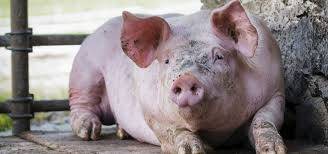Introduction: Pork is a widely consumed meat around the world, known for its unique flavor and versatility in cooking. However, there are compelling reasons to consider reducing or eliminating pork consumption from one's diet. This article will explore the health and ethical aspects surrounding pork consumption, shedding light on why you should reconsider your relationship with this popular meat.
Health Concern
High-Fat Content: Pork is known for its high-fat content, especially saturated fat, which has been linked to an increased risk of heart disease, obesity, and other health problems. By reducing or eliminating pork from your diet, you can lower your intake of unhealthy fats and promote better cardiovascular health.
Potential for Parasites and Diseases: Pigs can carry various parasites and diseases, including trichinellosis and hepatitis E, which can be transmitted to humans through undercooked or contaminated pork. These infections can lead to severe health complications, making it crucial to ensure proper cooking temperatures and hygienic handling practices.
Sodium and Preservatives: Processed pork products such as sausages, bacon, and ham often contain high amounts of sodium and preservatives. Excessive sodium intake can contribute to hypertension and other cardiovascular issues. Opting for leaner protein sources can help you reduce your sodium consumption and promote a healthier diet.
Ethical Considerations:
Animal Welfare: The ethical treatment of animals has gained significant attention in recent years. Industrial pork production often involves practices that compromise the well-being of pigs, including cramped and unsanitary living conditions. By choosing to abstain from pork, you can align your dietary choices with compassion and support more ethical farming practices.
Environmental Impact: Pork production is associated with substantial environmental impacts, including deforestation, water pollution, and greenhouse gas emissions. The intensive resource consumption required for large-scale pig farming contributes to climate change and the loss of biodiversity. By reducing pork consumption, you can contribute to a more sustainable and environmentally conscious food system.
Antibiotic Use: The pork industry relies heavily on the use of antibiotics to promote growth and prevent diseases in crowded pig farms. This widespread use of antibiotics contributes to the rise of antibiotic-resistant bacteria, posing a significant threat to public health. By reducing your pork consumption, you can help mitigate the overuse of antibiotics and safeguard the effectiveness of these critical drugs.
Alternatives and Benefits:
Healthier Protein Sources: By replacing pork with leaner protein sources like poultry, fish, legumes, and tofu, you can enjoy a wide range of nutrient-rich options that are lower in fat and offer various health benefits. These alternatives provide essential amino acids, vitamins, and minerals while reducing the health risks associated with pork consumption.
Culinary Exploration: Cutting down on pork can open up a world of culinary exploration. Embrace new flavors and experiment with vegetarian or plant-based dishes, which can introduce you to exciting ingredients and cooking techniques while expanding your palate.
Conclusion: Reducing or eliminating pork consumption from your diet can have numerous health and ethical benefits. From lowering fat intake and reducing the risk of diseases to promoting animal welfare and a more sustainable environment, these reasons should prompt you to reconsider your relationship with pork. By making conscious dietary choices, you can improve your well-being, support ethical practices, and contribute to a healthier planet.



No comments yet
Be the first to share your thoughts!